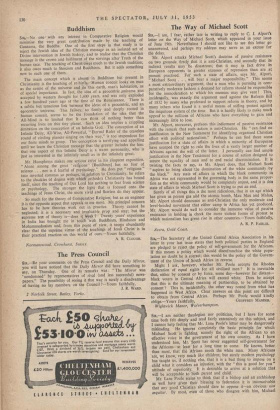Buddhism
SIR,—No one' with any interest in Comparative Religion would minimise the very great contribution made by the teaching of Gautama, the Buddha. One of the first steps in that study is to reject the Jewish idea of the Christian message as an isolated act of Divine intervention in Jewish history, and to realise that the Christian message is the crown and fulfilment of the strivings after Truth of the human race. The teaching of Christ owes much to the Jewish tradition;
• it also owes much to Stoicism and Buddhism. But it adds something new to each one of them.
The main concept which is absent in Buddhism but present in Christianity is the teaching of re-birth,. Human conceit looks on man as the centre of the universe and on this earth, man's habitation, as of special importance. In fact, the idea of a geocentric universe was accepted by western thought for 1,400 years, and was only exploded a few hundred years ago at the time of the Renaissance. There is a subtle but tenacious link between the ideas of a geocentric, and an egocentric universe. This fallacy, so firmly and deeply rooted in human conceit, seems to be the foundation of the idea that the All-Mind is so limited that It can think •of nothing better than recurring lives on this tiny planet. Such an idea implies a crippling ,limitation on the conception of an Infinite God. The conception of an Infinite Deity, All-Wise, All-Powerful, "Eternal Ruler of the ceaseless round of circling planets .singing on their way," is too stupendous for our finite minds to grasp. This conception is terrifying and appalling until we learn the Christian message that the greater includes the less: that one aspect of this Infinite Deity is a warm personality, who is just as interested in the infinitely small as in the infinitely great.
Mr. Humphreys makes one serious error in his eloquent exposition. "Alone among the great religions' [Buddhism] has no fear of science . . . nor is it fearful of psychology." He does put " religions " into inverted commas so perhaps, in relation -to Christianity, he refers to the shackles Of dogma with which orthodox Christianity has bound itself, since the teaching of Our Lord has nothing to fear from science or psychology. The stronger the light that is focused onto the teachings of Jesus Christ, the more vivid and flawless do they appear.
So much for the theory of Comparative Religion; but as an engineer it is thd opposite aspect that appeals to me most. My principal concern has to be how theories work out in practice. Theory cannot be - neglected; it is a necessary and invaluable prop and stay; but the supreme test of theory is—does it work ? Twenty years' experience in India has brought me in touch with Buddhism, Hinduism and Mohammedanism and, from this point of view, it seeirs abundantly clear that the supreme virtue of the teachings of Jesus Christ is in their practical reaction on this world of ours.—Yours faithfully, A. R. CLOUOH. Normans wood, Crowhurst, Sussex.


































 Previous page
Previous page